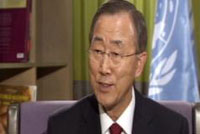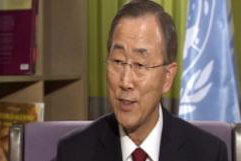Ban Ki-moon has probably one of the most difficult jobs in the world.
 As Secretary General of the UN, he has to seek international concord on a range of thorny issues, such as climate change, immigration, development, world poverty,
As Secretary General of the UN, he has to seek international concord on a range of thorny issues, such as climate change, immigration, development, world poverty,
Christophe Midol-Monnet of euronews caught up with him in
Ban Ki-moon has probably one of the most difficult jobs in the world.
As Secretary General of the UN, he has to seek international concord on a range of thorny issues, such as climate change, immigration, development, world poverty,
Christophe Midol-Monnet of euronews caught up with him in
Christophe Midol-Monnet:
“Mr Secretary General, welcome to euronews. In the weeks ahead, climate change will be back on top of the international agenda. Do you agree with José Manuel Barroso that the Cancun Summit in December will most probably fail in renewing the Kyoto Protocol on climate change? Why are these negotiations so painfully unsuccessful?”
Ban Ki-moon, United Nations Secretary General:
“This is a matter of political will of the member states. There is a high awareness in the international community that this climate change issue is a defining issue of our era. There is no question about that. It may be the case that we may not be able to have a globally acceptable agreement, a comprehensive and binding agreement, but we have been making some tangible progress in deforestation and forest degradation, providing financial support particularly fast, starting support for developing countries, technology adaptation and capacity building. We have to build upon these five areas so that we will have a much better progress when we go to
that we may not be able to have a globally acceptable agreement, a comprehensive and binding agreement, but we have been making some tangible progress in deforestation and forest degradation, providing financial support particularly fast, starting support for developing countries, technology adaptation and capacity building. We have to build upon these five areas so that we will have a much better progress when we go to
euronews:
“Although economically necessary, immigration is more and more depicted in
Ban Ki-moon:
“I know that there has been some controversy in some European countries over migrant workers and minorities. As far as the United Nations is concerned, as Secretary General, we are urging all the member states to provide and to protect the full human rights of those people whose human rights might be discriminated against, and might not be fully protected. The United Nations has taken a initiative by convening an international forum of ‘Migration for Development.’ We have had a meeting already three times. We are going to continue this one. Now the purpose of these meetings is: how we can use these migrating workers’ contribution towards a very positive and favourable way of social and economic development.”
euronews:
“So, in your view, the migration issue is not worse in
Ban Ki-moon:
“This is a common phenomenon elsewhere. There is a tendency that people regard these migrant workers as ‘The Others.’ But if we are more generous enough and more inclusive, then they can be ‘Ours.’ Likewise the people of our countries can also be regarded as ‘The Others’ in other countries. Therefore social inclusion is very important. I believe in cultural diversity. I believe in mobility. And therefore, all this cultural diversity should be promoted and respected in a positive way.”
euronews:
“In terms of solidarity worldwide, what do you expect from the G20 Summit to be held in
Ban Ki-moon:
“For the first time in the G20’s history, the leaders are going to take up the development agenda. While they will be discussing how to consolidate their financial situation, how to make austerity, at the same time, they will discuss how the G20 leaders can provide the sense of hope and how they can deal with all extreme poverty issues, how they can deal with overall development issues, including climate change. That is quite encouraging.”
euronews:
“Negotiations with
Ban Ki-moon:
“I have discussed this matter with Lady Ashton (the European Union’s foreign policy chief). I am encouraged that the talks have been moving towards a favourable direction. Whenever and wherever I have been meeting Iranian authorities, I have been urging them to return to dialogue and engage negotiations with E3+3 and that seems to be happening as soon as in early November. As Secretary General, I will spare no efforts to facilitate such negotiation process. There is no other way but dialogue, through which we can resolve this issue in a peaceful manner.”
euronews:
“What is your position about a more and more frequently heard proposal: welcoming a new member into the United Nations, namely
Ban Ki-moon:
“Now

 Previous page
Previous page Back to top
Back to top







